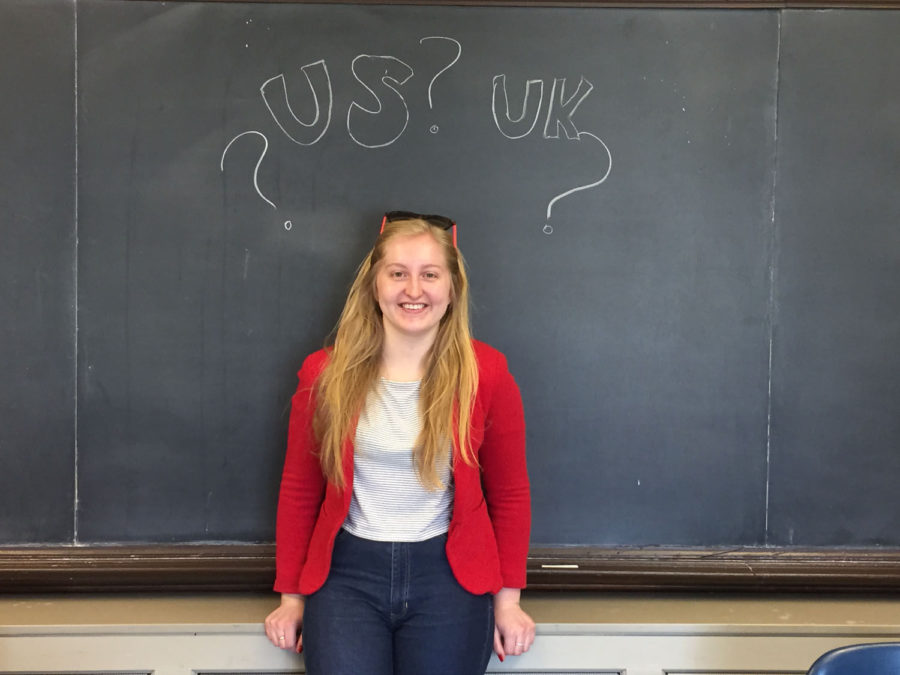United and divided: Cultures of the U.S., U.K.
Mar 18, 2015
From the combinations of the Greek alphabet’s 24 letters to the colors that signify a particular chapter, Greek life has become commonplace in most of American college culture.
But these sights and sounds are completely new for many students studying at the University from the U.K., including Will Purcell, an English international student in FAA, and Katherine Burns, a Scottish international student in LAS.
And it’s just one of many cultural misunderstandings for the two.
Burns said she was immediately taken aback by Greek life and had to explain to her friends at home that it was real, not just created for films. Purcell said that while Greek life seemed like it could be fun, the gender segregation was uncomfortable and seemed rooted in societal heteronormativity.
Despite its flaws, the two international students saw the University campus as very American. Burns gestured to the South Quad, where a boy was throwing a baseball while two girls studied on the grass.
Get The Daily Illini in your inbox!
“My friend thought my experience would be exactly like ‘Monsters University,’” she said. “It just looked so American and so nice, and it’s such a good school.”
In the U.K., she was only familiar with Oxford and Cambridge as they have some of the highest reputations, where as here, many colleges and universities gain notoriety.
“(College is) all about sports and huge universities,” Skidmore said.
Purcell agreed that sports were surprising in America. Most university sports are club-organized, and they compete with nearby universities. He said the level of commitment and school spirit shown in Big Ten athletics was very surprising, especially during homecoming.
“The footballers all came out and bowed and everybody cheered for them, and they’re so highly regarded,” he said.
But Burns also said she notices different interactions. After she arrived at the University in the fall semester, she noticed race relations immediately.
“The differences in society are based in class back home, whereas here I’m doing lots of classes on race, and it seems like race is the dividing factor in America,” she said.
Racism still exists in the U.K., but it is not as nationally present and focuses on different racial groups, Purcell said. Both students pointed to the racially-charged history of the U.S. as an explanation but still said that the prevalence was surprising.
Gun use was another surprise.
“Just guns being a thing in society is very odd to me,” Purcell said, motioning to the “no guns” sign on the doors of the Undergraduate Library.
He said that the appropriation of violence in the U.S. was unsettling, referencing pink rifles covered with cartoon characters being marketed towards children.
Isabel Skidmore, freshman in LAS, who arrived at the University last fall, also referred to the casual nature of gun use in the U.S.
“I don’t think it’s something that everyone just has in their house,” she said.
Skidmore moved to Switzerland when she was seven years old and has family in London and Essex, U.K.
“I think that (in) the U.S., the people are a lot more overtly friendly,” she said.
In America, people will say “bless you” on the street if you sneeze, which she said was rare in Europe.
Burns said she was surprised by random girls complimenting her outfits and people holding doors open, even though people in Scotland are not standoffish.
“I feel like ‘Parks and Recreation’ does a very good job of portraying American stereotypes,” Purcell said. “I can buy a soda the size of my head for one dollar. That’s insane.”
Burns said she was prepared for the portion size, but cravings were the worst surprise for both Burns and Purcell, who said there were days when all they wanted were fish and chips, as stereotypical as it may be.
American food is still good, though it may be overly fried, artificial and high in sugar, according to Purcell, who said he was pleased with burritos and snow cones.
Purchasing anything was a bit of a challenge at first, because taxes change the price from what is on the tag, Burns and Purcell said.
“We’re taxed more, but then we get more benefits,” Purcell said, mentioning the National Health Service (NHS). “People get confused about the fact that the NHS is a good thing.”
The students’ accents, an obvious indicator of their international status, were received very differently, though the two live five hours apart in the U.K.
“People can’t understand a word I say,” Burns said of her accent, which Purcell assured was mild.
He said his voice made people remember him, and thought it sounded clever and academic.
While American culture took some adjusting to, Purcell said he felt more stereotypically British the longer he stayed. However, Burns said she did not feel out of place at the University, especially after studying here last semester.
“This isn’t America, this is one aspect of America,” Purcell said.






